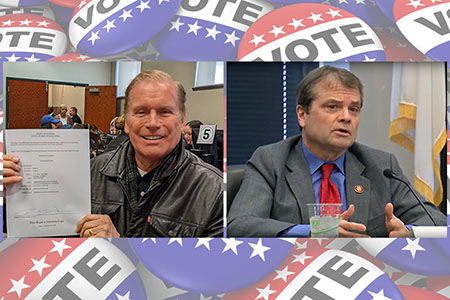Tougher federal and state laws needed to protect condominium owners Register homeowner associations with federal and state authorities, including consumer protection agencies? Put condo board members in jail for violating state ordinances? Randomly select unit owners to serve on their condo board? Don DeBat makes the case. Jul. 9, 2015 – The condominium lifestyle has been glorified as carefree, chic, and glamorous. However, condo ownership in Chicago and across the nation has problems, including steep community association maintenance fees, restrictions on day-to-day living, and limited personal freedoms. These very real costs to the 67 million Americans living in association-governed communities may require consumer-targeted legislative changes and more proactivity by community association residents in the future, according to Sara Benson, co-author of Escaping Condo Jail, a new book that outlines the keys to navigating the risks and surviving the perils of association-governed living. “Proactive involvement by owners and legislative solutions would protect consumers and their investments at the most sacred level – at the heart of their homes,” Benson said. Here are three key recommendations, outlined in the book, that if put in force would free millions of home and condo owners from Condo Jail…
Owner involvement. Owners in individual condominium and homeowner associations should take proactive and affirmative steps to ensure owner involvement in the governance of their associations.
State consumer protection. The second solution would require states to amend existing condominium and homeowner association laws to require community association registration to protect consumers in terms of public safety and ordinance enforcement. Federal consumer protection. The third and most logical solution involves steps at the federal level. This is the most powerful of the three solutions and if properly enacted, would offer the most consumer protection of all. Benson offers specific details on three intriguing ideas to protect condo owners… Mandate education and voluntary board service. The nation’s 367,000 association-governed communities – all condo and homeowner associations – should require mandatory board service by all owners in a random selection process. This would promote member equality and prevent unfair board service terms due to lack of volunteers. It also would prevent voting fraud and help thwart undisclosed business arrangements by board members.
Every condo or homeowner association bylaws or declaration should be amended to include a mandatory disclosure and the requirement for condominium buyers to become educated and to perform service. In order to be enforceable, the essential changes to the bylaws – or to the declaration – should be recorded where the original declaration was recorded. And, every single owner must be willing and able to take a required basic educational class on board functions and fiduciary duties. “Education and training should be absolutely mandatory for anyone who purchases in a community association, as the vast majority of owners do not understand anything about the importance of governance – or voting – and keeping an eye on the financials,” Benson writes. “The rampant lack of knowledge is overwhelming.” Create a state registration system for associations. Every state must have a mandatory condominium registration system. A state association registration system should be created for the purpose of ensuring public safety, structural soundness, sanitation, building code ordinance enforcement, and homeowner assistance in all community associations.
Registration would ensure public safety of properties by identifying law enforcement, fire department access, and public utilities that provide water, sewer, gas, and electric service. Registration also would ensure structural soundness via elevator safety inspections, porch and balcony safety, and building code compliance. The registration system should provide ordinance enforcement that requires filing of annual corporation documents with the state, filing of tax returns, and compliance with state ordinances. “It also would provide theft prevention via mandatory transparency of all board financial records to unit owners,” Benson said. “There should be swift judicial process and potential incarceration for directors that knowingly and willingly break state ordinances.” Registration also is necessary to provide homeowner assistance, including hot-line telephone and Internet portal, to report statute violations, lodge complaints, and for whistleblower protection. There also should be mandatory training for property managers, including self-governed associations and mandatory initial arbitration for disputes. Federal condo risk disclosure and oversight. A federal condo risk disclosure and oversight law is needed to protect consumers. This should provide full disclosure of risk of loss of investment and assist in maintaining community associations as a viable form of housing in America. Consumers already have some federal protection through loan cost disclosure via the Real Estate Settlement Procedures Act and the Federal Fair Housing Act. However, condos were excluded from the Interstate Land Sales Act in 2014, so condo buyers need more federal protection, consumer advocates say. The strongest argument for a comprehensive national federal law covering condo risk disclosure and oversight is that abuses are so widespread that virtually every state has failed to effectively curb the violations. Common interest community ownership is analogous to a security – and federal legislation is needed to protect the consumer. The federal government has been proactive in mandating full disclosure of all costs associated with a real estate closing, disclosure of lead-based paint hazards, and property report disclosures. Failure to obtain these disclosures prior to signing a contract or loan document carries heavy penalties. “Further consumer protection is needed at the federal level,” Benson declared. “To ensure compliance and to promote fair housing, every existing and projected condo association should be registered with the U.S. Department of Housing. Not only projects in excess of 100 units but each and every association.” A federal pamphlet outlining the dangers of investing and how to protect your condo association against abuse, neglect, theft, and mismanagement should be given to every prospective purchaser of a condominium or property governed by a homeowners association. Meet Don DeBat and Sara Benson, get answers to your condo questions Are you a condominium owner who is having problems with your condo association board or management company? Valuable consumer information and many little-known solutions will be offered on July 16 from 5 p.m. to 7 p.m. at Powell’s Books, 1218 South Halsted Street, from the authors of Escaping Condo Jail. For more information, call 312-833-2955 or visit: www.EscapingCondoJail.com. Realtor Sara Benson and veteran journalist Don DeBat will give a presentation on some of the current problems affecting condo owners, discuss the content of their book, and answer questions from interested homeowners during the consumer education session. Condo owners are invited to email their questions in advance to: EscapingCondoJail@gmail.com.
|







 Previous story:
Previous story: 








